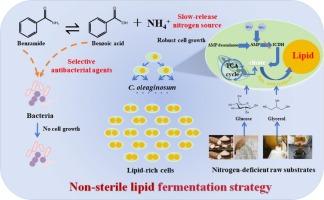Non-sterile fermentation for enhanced lipid production by Cutaneotrichosporon oleaginosum using bifunctional benzamide as selective antibacterial agent and unique nitrogen source
IF 9
1区 环境科学与生态学
Q1 AGRICULTURAL ENGINEERING
引用次数: 0
Abstract
The commercial success of micro-biodiesel is currently impeded by the high lipid production cost. Here, a novel non-sterile lipid fermentation strategy was successfully developed by using bifunctional benzamide as selective antibacterial agent and unique nitrogen source. DCW, lipid concentration, and lipid content reached 24.45 g/L, 15.85 g/L, and 64.80 % when Cutaneotrichosporon oleaginosum was cultured on 60 g/L glucose supplementing 1.5 g/L benzamide as sole nitrogen source under non-sterile condition in a 3-L bioreactor. Interestingly, the non-sterile fermentation containing high-loading of bacteria resulted in comparable lipid production with sterile fermentation. This non-sterile strategy could be expanded to inexpensive substrates including crude glycerol and cassava starch hydrolysate. The fatty acid compositions indicated lipids prepared by the non-sterile fermentation were suitable for biodiesel production. By avoiding the sterilization process, this strategy could effectively reduce energy consumption and simplify the production process, which was promising for improving the techno-economics of the lipid production technology.

以双功能苯甲酰胺为选择性抗菌剂和独特氮源的非无菌发酵提高油酸皮三磷酸丝虫病的产脂率。
目前,高脂质生产成本阻碍了微型生物柴油的商业成功。本研究以双功能苯甲酰胺为选择性抗菌剂和独特的氮源,成功地开发了一种新的非无菌脂质发酵策略。在3-L生物反应器中,以60 g/L葡萄糖和1.5 g/L苯甲酰胺为唯一氮源,在非无菌条件下培养油梨皮三磷酸丝氨酸,其DCW、脂质浓度和脂质含量分别达到24.45 g/L、15.85 g/L和64.80 %。有趣的是,含有高负荷细菌的非无菌发酵产生的脂质与无菌发酵相当。这种非无菌策略可以扩展到廉价的底物,包括粗甘油和木薯淀粉水解物。脂肪酸组成表明,非无菌发酵制备的脂质适合生产生物柴油。该策略避免了灭菌过程,有效降低了能耗,简化了生产过程,对提高油脂生产工艺的技术经济效益具有重要意义。
本文章由计算机程序翻译,如有差异,请以英文原文为准。
求助全文
约1分钟内获得全文
求助全文
来源期刊

Bioresource Technology
工程技术-能源与燃料
CiteScore
20.80
自引率
19.30%
发文量
2013
审稿时长
12 days
期刊介绍:
Bioresource Technology publishes original articles, review articles, case studies, and short communications covering the fundamentals, applications, and management of bioresource technology. The journal seeks to advance and disseminate knowledge across various areas related to biomass, biological waste treatment, bioenergy, biotransformations, bioresource systems analysis, and associated conversion or production technologies.
Topics include:
• Biofuels: liquid and gaseous biofuels production, modeling and economics
• Bioprocesses and bioproducts: biocatalysis and fermentations
• Biomass and feedstocks utilization: bioconversion of agro-industrial residues
• Environmental protection: biological waste treatment
• Thermochemical conversion of biomass: combustion, pyrolysis, gasification, catalysis.
 求助内容:
求助内容: 应助结果提醒方式:
应助结果提醒方式:


